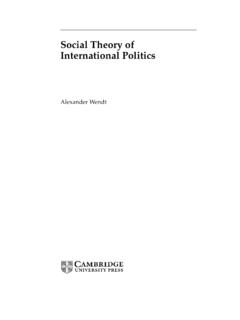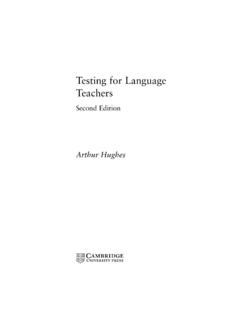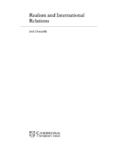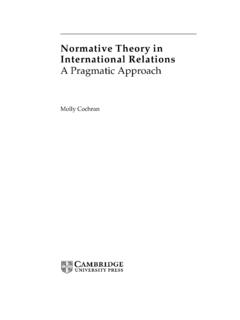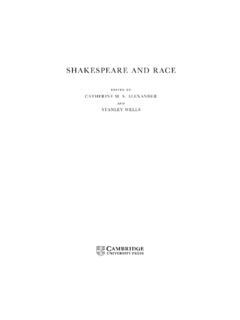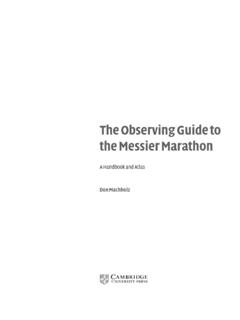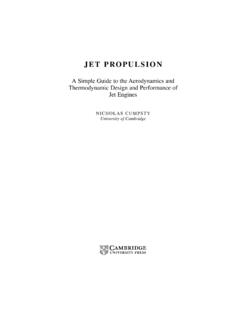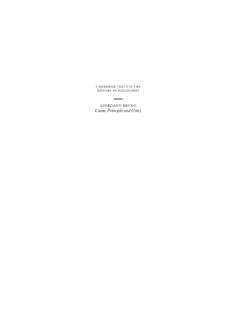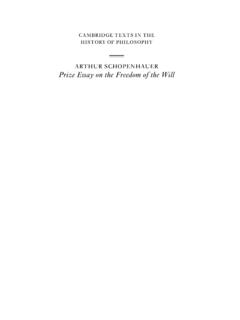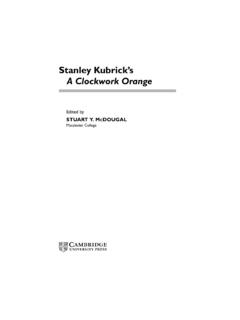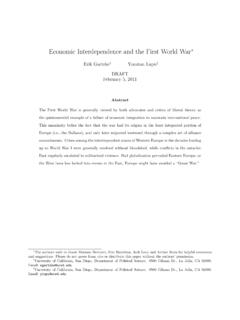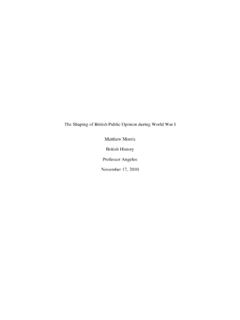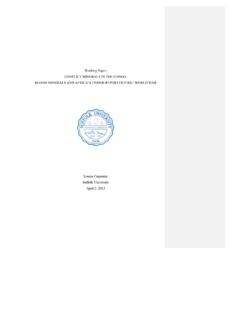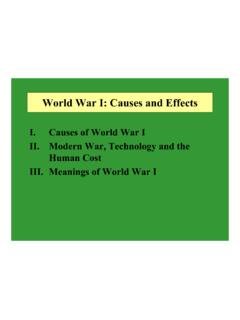Transcription of TheOriginsofWorldWarI - The Library of Congress
1 The Origins of World War IEdited byRICHARD F. HAMILTONOhio State UniversityHOLGER H. HERWIGU niversity of Calgarypublished by the press syndicate of the university of cambridgeThe Pitt Building, Trumpington Street, Cambridge, United Kingdomcambridge university pressThe Edinburgh Building, Cambridgecb2 2ru,uk40 West20th Street, New York,ny 10011-4211,usa477 Williamstown Road, Port Melbourne,vic 3207, AustraliaRuiz de Alarc on13,28014 Madrid, SpainDock House, The Waterfront, Cape Town8001, South Cambridge University Press2003 This book is in copyright. Subject to statutory exceptionand to the provisions of relevant collective licensing agreements,no reproduction of any part may take place withoutthe written permission of Cambridge University published2003 Printed in the United Kingdo mat the University Press, Ca mbridgeTypefaceSabon10 [tb]A catalog record for this book is available from the British of Congress Cataloging in Publication DataThe origins of World War I / edited by Richard F.
2 Hamilton and Holger H. bibliographical references and 0-521-81735-81. World War,1914 1918 World War,1914 1918 World War,1914 1918 Historiography. I. Title: Origins ofWorld War One. II. Title: Origins of World War I. III. Hamilton, Richard Herwig, Holger 11 dc212002067092isbn 0 521 81735 8hardbackContentsList of Tables and MapspageixContributorsxiAcknowledgmentsx iii1 World Wars: Definition and Causes1 Richard F. Hamilton and Holger H. Herwig2 The European Wars:1815 191445 Richard F. Hamilton3 Serbia92 Richard C. Hall4 Austria-Hungary112 Graydon A. Tunstall, H. Herwig6 Russia188 David Alan Rich7 France227 Eugenia C. Kiesling8 Great Britain266J. Paul Harris9 Japan300 Frederick R. Dickinson10 The Ottoman Empire337 Ulrich TrumpenerviiviiiContents11 Italy356 Richard F. Hamilton and Holger H. Herwig12 Bulgaria, Romania, and Greece389 Richard C. Hall13 The United States415 John Milton Cooper, Did It Happen?
3 443 Holger H. Herwig15On the Origins of the Catastrophe469 Richard F. HamiltonAppendix A: Chronology, 1914507 Geoffrey P. MegargeeAppendix B: Dramatis Personae520 Appendix C: Suggested Readings525 Index532 List of Tables and Wars,1815 Europe, Balkans, Balkans after the Peace Settlement, Groups of the Habsburg Empire, , Germany, and and the ,1914361ix1 WorldWarsDefinition and CausesRichard F. Hamilton and Holger H. HerwigItisonlyfairtoask:Whyanotherbookon 1914?Surely,theoriginsofthatwar have been studied, reviewed, and revised almost beyond any reader sendurance. Vladimir Dedijer, arguably the leading expert on the Sarajevoassassination, claimed that already in1966more than3,000books hadbeen published on that subject alone. And the torrent of ink spilled onthat tragic murder has never abated. Hence, why more? ,whopreciselywerethedecisionmakers?Monar chs, presidents, foreign ministers, staff chiefs, or a combination ofthese?
4 And what were their mindsets in July1914? How had the ex-periences of the recent past (and especially of the two Balkan Wars of1912 13) shaped their outlooks? Second,howdid those governments goabout declaring war? In other words, was there a constitutional defini-tion of war powers? Were cabinet and parliamentary approval requiredin all cases? Or could war be declared simply by royal fiat? Third,which social forces or extraparliamentary lobbies had input into the decisionfor war? And fourth, whatwerethe reasons? What were the justificationsfor the decisions to go to war? Why did those decision makers do it?Were there common or similar justifications? Or is a differentiated read-ingneeded?Inshort, not only answers, but, above all, stimulus for further thought F. Hamilton and Holger H. HerwigTheRoadto1914 World War I, once called the Great War, seems to defy explanation: Whydid it happen?
5 Numerous books on the subject carry the words causes or origins in their titles. The literature on the subject is extensive, prob-ably the largest for any war in human address that question,we begin with a definition of what constituted a world war and thenproceed to a discussion of possible causes regarding that the numerical suffix established in1919for the war toend all wars (1914 18) as constituting the first world war is , we see it in terms of thelongue dur ee, of five centuries of conflictsthat transcended normal or short wars in terms of both intensityand globalization. We offer this overview to place the Great War inhistorical perspective, fully aware that our selections are open to debate(precisely our intention).We define a world war as one involving five or more major powersand having military operations on two or more continents. Wars of suchextent are costly principal actors therefore have to berich nations and ones with substantial intercontinental outreach.
6 Rich, ofcourse, is a relative term. The masses in a given nation might have beenpoor, but that nation, relative to others, could be rich, sufficiently so as toallowittosustainlargearmiesandnaviesin distantstrugglesforextendedperiods. For example, The Netherlands could do that in the ,whenrelativeto others it was not so rich, that nation was no longer a great power. China,arichnation, a demonstrated ability to reach out, but then in1433by imperialdecree the voyages ceased, overseas trade was severely restricted, and theconstruction of ocean-going ships stopped. Confucian-trained officials, itseems, opposedtradeandforeigncontactonprinciple . 2 China sforeigninvolvementended at that central Europe tore itself apart during the Thirty Years War(1618 48), eight wars fit our definition of a world war. They are: the1 For a partial listing, see the first section of the bibliography, Appendix King Fairbank,China: A New History(Cambridge,1992), 9; and LouiseLevathes,When China Ruled the Seas: The Treasure Fleet o fthe Dragon Throne, 1403 1433(New York,1994).
7 Levathes reports a more extended transformation: In less thana hundred years, the greatest navy the world had ever known had ordered itself intoextinction ( ). In the course of the fifteenth century, she reports, China s tax baseshrank by almost half ( ).World Wars: Definitions and Causes3 War of the Grand Alliance (sometimes called the War of the League ofAugsburg),1689 97;theWaroftheSpanishSuccession,1701 14;theWarof the Austrian Succession,1740 48; the Seven Years War,1756 63; theFrench Revolutionary Wars,1792 1802; the Napoleonic Wars,1803 15;then, after a ninety-nine-year interlude, World War I,1914 18; and, twodecades later, World War II,1939 45. The participating powers and mea-sures of battle fatalities are given in our definition,within this time span the Great War was actually World War few cautionary remarks should be noted. The severity figures inthe table considerably understate the total wartime deaths: Neither civil-iandeathsnorthedeaths militaryandcivilian sufferedbysmallercoun-tries ( , not great powers) are included.
8 One source gives World War Ideaths as14,663,000and World War II as in relative terms (losses per1,000of population), some other warswere much more destructive. The victorious Athenians put to death allthe grown men of Melos in416 destruction of Carthage in146 , it is said, was essentially total. Taking an unlikely high es-timate of European losses in World War I, one author suggests a loss of The German states lost one-fifth of their populationin the Thirty Years War; Prussia, one-seventh of its population in theSeven Years War. A very destructive war, one that receives little atten-tion, was a civil war, the Taiping Rebellion in China (1851 64), with aloss of some20million lives. We routinely focus on wars as the big killingevents but neglect another even more lethal one. In March1918an in-fluenza epidemic broke out among army recruits in Kansas. Subsequently3In Britain s North American colonies, the first three wars are known as King William sWar, Queen Anne s War, and King George s War.
9 The Seven Years War is known there asthe French and Indian War; in Germany it is called the Third Silesian table suggests a level of knowledge and degree of precision that, as seen below,is not warranted. The severity/intensity numbers are rough estimates best interpreted ,forexample,endedwiththePeaceofUtrecht,1 713,butthatwas supplemented with other treaties in1714. For brief reviews, see Stanley Chodorow,MacGregor Knox, Conrad Schirokauer, Joseph R. Strayer, and Hans W. Gatzke,TheMainstream o fCivilization,6thed. (Fort Worth,1994); Donald Kagan, Steven Ozment,and Frank M. Turner,The Western Heritage,7thed. (Upper Saddle River, ,2001); andR. Ernest Dupuy and Trevor N. Dupuy,The Encyclopedia o fMilitary History from to the Present,4thed. (New York,1993). For brief reviews of those wars in NorthAmerica, see John M. Blum, Edmund S. Morgan, Willie Lee Rose, Arthur M.
10 Schlesinger,Jr., Kenneth M. Stampp, and C. Vann Woodward,The National Experience: A Historyo fthe United States,8thed. (Fort Worth,1993).4 Dupuy and Dupuy,Encyclopedia o fMilitary History, F. Hamilton and Holger H. Herwigtable WarsNumberofWarDates greatpowers CountriesaSeveritybIntensitycGrand Alliance1689 975 ABFNS680 6,939 Spanish Succession1701 145 ABFNS1,251 12,490 Austrian1740 486 ABFPRS3593,379 SuccessionSeven Years War1756 636 ABFPRS992 9,118 French1792 18025 ABFPR663 5,816 RevolutionaryWarsNapoleonic Wars1803 155 ABFPR1,869 16,112 All European wars,1815 1913 3or fewer A:6;B:1; Fewer Fewer1815 1913(N=18)F:8;R:5than than2171,743 World War I1914 188 ABFGIJRU7,734 57,616 World War II1939 457 BFGIJRU12,948 93,665aCountries participating in war: A: Austria-Hungary; B: Britain (England); F: France;G: Germany; I: Italy; J: Japan; N: Netherlands; P: Prussia; R: Russia; S: Spain; U: United of war: total battle fatalities suffered by great powers, in of war: total battle fatalities suffered by great powers, per million European :Joshua S.
